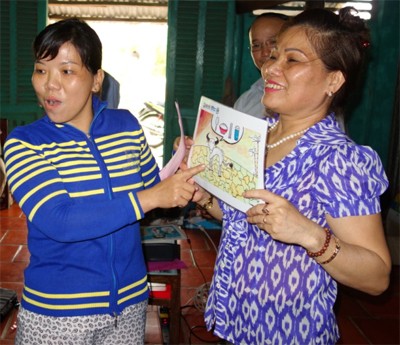
July 2015—Farmers across coastal delta communities in the Lower Mekong Basin are experiencing firsthand the negative effects of climate change. Rainfall in the area has become more and more irregular, ruining crops and threatening livelihoods.
“For the first time in 15 years, my rice crop has completely failed,” said Le Hoang An, a farmer from Thuan Hoa commune in Vietnam’s Mekong Delta. “We didn’t get enough rain to wash the salt from the field, so the rice died when its roots hit the salty layer in the soil.”
An, along with thousands of farmers in the Mekong Delta, has a dual shrimp-rice system, which means his land is used to grow rice for half the year and cultivate shrimp during the other half. He relies on heavy rainfall to flush out the residual salt from the shrimp cultivation to prepare the soil for growing rice. But with increasingly unpredictable changes in the weather, it has become more challenging to use this approach.
USAID’s Mekong Adaptation and Resilience to Climate Change project and its partners, the Asian Management and Development Institute and the Vietnam Red Cross, worked with 40 farmers in Thuan Hoa in March 2014 to pilot a new shrimp-rice adaptation strategy to prepare their dual cultivation system for irregular rainfall and rising sea levels. The shrimp farmed in this system are stocked at low densities and the input of feed to the ponds is low so there are no harmful effects to the environment.
Activities also included growing salt-tolerant rice, regularly measuring salinity, and developing shrimp nurseries to speed growth and increase productivity so fields can return to rice cultivation more quickly.
Most farmers in rural, under-resourced communities are unaware of how climate change will affect them. After six months of project operation, the number of villagers who reported being aware of climate change tripled and the number of villagers who could successfully identify at least one climate change adaptation strategy quadrupled.
“The workshops helped me to understand how salt-tolerant rice can cope with different weather and soil conditions,” said An.
Villages also received more than 1.5 million post larvae shrimp, a salinity measurement device, and shrimp feed for their nursery. One commune representative received a water testing device for controlling and monitoring local water quality for shrimp-rice farms and other purposes.
“All households are satisfied with the quality of post larvae shrimp,” said Tran Van Nom, a shrimp farmer. “The shrimp are healthy, big and fetch a good price. We commit to properly perform technical requirements and take good care of the shrimp to ensure success.”
In addition, the project is introducing sources of alternative income to the village. Ten households that raise pigs for a source of income will receive two piglets, assistance with pigpen modification, bio-mattresses and feed.
The bio-mattress—composed of rice husks, sawdust, shredded straw or other organic materials inoculated with a microbial mix—turns pig waste and plant material into high-quality organic compost. It eliminates the need to regularly flush raw pig waste into the environment downstream from the pen, which greatly reduces production of foul odors and helps to reduce transmission of pig parasites through their waste.
The Asian Management and Development Institute will continue to oversee activities of participating households with support from local staff to ensure proper implementation. These adaptation measures will help Thuan Hoa farmers strengthen their resilience to climate change and yield valuable lessons for scaling these adaptation measures across the wider Mekong Delta.
“We are very excited and believe the bio-mattress will be successful,” said villager Tran Van Ro. “After this project, we will modify the rest of my family’s pigpens to use bio-mattresses to reduce environmental pollution as well as save cost and labor.”
The Mekong Adaptation and Resilience to Climate Change project runs from 2011 to 2016.
LINKS
Follow @USAIDAsia, on Facebook, on Flickr, on YouTube







Comment
Make a general inquiry or suggest an improvement.